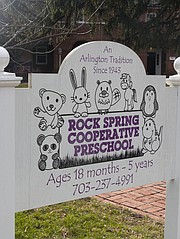The Arlington County Board on Feb. 23 pulled draft revisions of Chapter 52 child care regulations from the public comment website after voluminous comments, "some quite pointed," had been received criticizing a number of the draft provisions.
At the County Board meeting, Anita Friedman, director of the Department of Human Services, outlined the background for the proposed revisions. She explained the Arlington County child care regulations currently affecting 79 facilities were put in place in the late 1960s. Except for minor administrative changes in 1981 they haven't been updated since. Until 2014 when Virginia updated the state regulations to be in compliance with a new Federal law, Arlington's regulations were still more stringent than the state.
Friedman said Arlington prides itself on being the best. But she said the Arlington regulations "no longer reflect the future trend in child care to go from babysitting to early early childhood education,” although she admitted that "in some cases we may have over reached." She added, "We went into the process somewhat naively and over zealously on what day care would actually look like. I take full responsibility for this mess." But she added that she firmly believed this outpouring of comments, even if negative, is a good thing.
County Board Member John Vihstadt said this rollout of the draft regulations was the most troubled since public land for public good. "It was an unmitigated disaster. If the goal was to increase the supply and affordability, this does just the opposite."
Katie Cristol, a new County Board member, observed that "the level of best practice had been conflated with the code." She said the document online should reflect the health and safety practices that are likely to be code and that can be supplemented with best practices. "This is silly season business. I object to the insertion unbidden of the government telling a mother how to feed her child."
"We went into the process somewhat naively and over zealously on what day care would actually look like.”
—Anita Friedman, director, Department of Human Services
Section 52.34 set out frequency and number of snacks and meals as well as the kind of foods, juice and milk (1 percent) that must be provided by child care centers. Cristol added, "We have been hearing in this process that Arlington is hostile to daycare centers. There are broader concerns, and this might be in conflict with other county goals. Young families are leaving because daycare is so expensive."
County Board chair Libby Garvey said, "On another level there is some upset that anyone thought some of this was a good idea, a lack of judgment. The buck stops here and we're going to fix it."
One of the most hotly debated sections focuses on draft regulation 52-22E1b, the qualifications for teachers. This provision in the draft regulations allows a bachelor's degree in a related field (to child development or early childhood education) with at least nine semester hours credit or quarter equivalent of advanced study in child development or early childhood education. The paragraph in the original code allowing two or more years of college with at least 15 semester hours or quarter equivalent in childhood development or early childhood education is not included in the draft regulations.
Sabrina Brassard, director of Trinity Presbyterian Preschool on 16th Street N, says she gets most of her teachers from the category that has been eliminated. "The teacher qualifications provision for me is huge." She said a lot of her people are second career people so they won't go back and get their associate degree. We will lose all of our teachers."
Katrina Brubaker, a teacher at Trinity said, “I have a Master’s degree in speech pathology so I would be OK under the proposed regulations. However, if you had to go back to get qualifications, you would never make your money back; this is truly a labor of love.”
Pat McGeehan, director of Walker Chapel Preschool on N. Old Glebe Road agreed: "This will make it next to impossible for me to hire new teachers for our part-time, no health care positions." Directors of part-time child care centers argue the teacher requirements shouldn't be the same for full-time, full day programs and day care programs for a few hours a week.
Some provisions seem to impact many child care centers such as 52-34E that ensures mothers are encouraged to breast feed their infants and will safely store breast milk provided by the parent or the provision requiring a stamp from a doctor's office for physical exams. Others such as certain staffing requirements seemed to primarily affect the cooperative day care centers.
Crystal Jean, director of the Rock Spring Cooperative Preschool, says there are two additions in the draft that would ultimately make it impossible for Rock Spring to operate. One is the requirement that volunteers can never be left alone with children. The second is that volunteers cannot be included in child-to-adult ratios. She added, “Now that the draft has been withdrawn, we are hopeful that we will be able to work collaboratively with the county in updating the regs to meet the unique needs of cooperative preschools.”
Brassard said when the guideline revision began in 2014 that they laid out a process that sounded good but it went off track. Brassard said she participated in working groups established to get input from child care directors. "We filed reports, then at some point it went to the National Association for Regulatory Administration (NARA) who was a consultant hired by the county as part of the process. In March 2015 over 30 of us were in a room and given a numbered draft to review in 45 minutes. We had to turn it back in. We had a week to provide comments, and it was right before spring break. In June 2015 we got another draft and this time we could take it home. But we had to sign a piece of paper that stated we wouldn't copy it or show it to anyone. We had a day to make comments."
Brassard said that her comments were consistent each time about teacher qualifications but each time the draft came back with no changes in this area: "They had all of these meetings but they didn't listen to what we said. It went into a black hole."
Kurt Larrick, director of communications for the Arlington County Department of Human Services, said the draft circulated for public review was the product of collaboration between the child care licensing office staff, child care center representatives, parents, stakeholders and NARA. "We have worked hard to make it open, participatory and inclusive with multiple opportunities and methods available for stakeholders to engage in the process," he said.
Maxine M. Maloney, supervisor of Child Care Services for Arlington Child and Family Services sent an email on Feb. 17 that began, "we hear your concerns, feedback and recommendations regarding the proposed enhancements to Chapter 52!" She added that in response to feedback received that week the comment period was being extended to March 31. It continued, "the current comment period has shined light on some areas of the draft code that require examination." She added that the next iteration of the draft code will potentially include modifications in the staff requirements, medical care assessment requiring a physician's stamp and adult-student ratio requirements for cooperative preschools. The modification for staff credentials could include "grandfathering staff whose hiring predates certain credential requirements. All currently employed staff prior to the adopt of the proposed Chapter 52 may be exempt from the proposed qualifications; however all newly hired staff after the adopt of the proposed Chapter 52 must comply."
However, on Feb. 23 the County Board announced they were going to take down the draft. On Thursday, Feb. 25, a "Next Steps" email was sent from Child Care Central. "In view of all comments and recommendations we have decided to remove the proposed draft of Chapter 52 from the Open Arlington Comment tool. We are evaluating our process and developing a new plan of action."
Larrick said, "We plan to hold a series of group meetings with the specialized interests — larger child care centers, partial-day and coop programs and religiously exempt programs — to work through issues and concerns."

